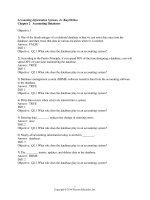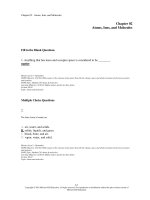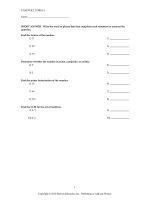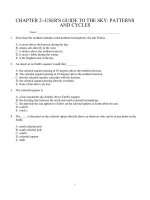Choosing success 2nd edition atkinson test bank
Bạn đang xem bản rút gọn của tài liệu. Xem và tải ngay bản đầy đủ của tài liệu tại đây (228.16 KB, 43 trang )
Chapter 02
Interacting with Your College Community
Multiple Choice Questions
1.
Short lists of important links on a campus website are known as:
A. HotLinks
B. QuickLinks
C. DirectLinks
D. HyperLinks
2.
For many students, their first resource for identifying and understanding the language of their
college community is:
A. The admissions office
B. The campus life office
C. The college catalog
D. The student newspaper
3.
Information about internships can most likely be found in the __________ section of your college
catalog.
A. Student services
B. Admissions
C. Academic standards
D. Academic policies
2-1
Copyright © 2016 McGraw-Hill Education. All rights reserved. No reproduction or distribution without the prior written consent of
McGraw-Hill Education.
4.
To obtain an official transcript of your grades, you should contact the:
A. Dean's Office
B. Business Office
C. Advising Office
D. Registrar's Office
5.
On many campuses, the __________ offers tutoring, workshops in study skills, and computerized
instruction.
A. Student Development Office
B. Learning Center
C. Dean's Office
D. Advising Office
6.
Understanding and appreciating campus diversity requires people to:
A. Be aware of their own prejudicial thoughts and feelings
B. Recognize stereotypical characterizations
C. Have an open mind toward others
D. All of these are correct
7.
Joining a campus social organization gives you the opportunity to:
A. Organize teams and compete against others
B. Get involved in campus life while getting paid
C. Have fun and make friends
D. Volunteer time for the benefit of others
2-2
Copyright © 2016 McGraw-Hill Education. All rights reserved. No reproduction or distribution without the prior written consent of
McGraw-Hill Education.
8.
Job recruiters are interested in students who have participated in campus life because:
A. They have something to talk about during interviews
B. They know that grades aren't really a measure of a person's ability
C. They like people who have participated in diverse activities and been academically successful
D. They admire people who know how to enjoy themselves
9.
Collecting food and clothing for the homeless is an activity most likely sponsored by:
A. Intramural sports
B. A special interest group
C. A service organization
D. All of these are correct.
10. Reading a newspaper or checking your emails during class:
A. Communicates your intelligence and popularity
B. Demonstrates your ability to multitask
C. Conveys your lack of interest in the lecture or discussion
D. Reflects your interest in the world at large
11. If you were emailing one of your professors, __________ would be the most appropriate way to
begin your correspondence.
A. "Hey! It's me, Michael, from your Bio class"
B. "Dear Professor Brown"
C. "To: Professor Kathleen Brown, Ph.D."
D. "Hi Brownie, this is your favorite student from Bio"
2-3
Copyright © 2016 McGraw-Hill Education. All rights reserved. No reproduction or distribution without the prior written consent of
McGraw-Hill Education.
12. If you think you have been unfairly graded, you should:
A. Speak directly with the professor in question
B. Go straight to the department chairperson
C. Make an appointment with the dean
D. Immediately file a grade grievance
13. When you are emailing a professor, your correspondence should not contain:
A. Grammatical and spelling errors.
B. Shorthand or abbreviations.
C. Highly personal information (e.g. discussions of illnesses, family problems).
D. All of these are correct.
14. What would be the best way to ask a question of your instructor?
A. "I have no idea what you're talking about"
B. "Help! I'm totally lost"
C. "I understand the first three theories you've presented, but not the fourth. Could you please
review that?"
D. "I'm confused. Can you start from the beginning?"
15. Factors that can influence communication include the participants':
A. Emotions
B. Backgrounds
C. Skills
D. All of these are correct
2-4
Copyright © 2016 McGraw-Hill Education. All rights reserved. No reproduction or distribution without the prior written consent of
McGraw-Hill Education.
16. __________ is not a good way to improve communication skills.
A. Becoming an active listener
B. Insisting that your view is always correct
C. Taking a speech course
D. Observing communication interactions
17. According to the textbook, conflicts may be resolved in __________ ways.
A. three
B. five
C. six
D. ten
18. An effective approach to conflict resolution is to:
A. Adopt a "take-no-prisoners" philosophy
B. Find someone to blame
C. Choose your battles
D. Stop speaking to people with whom you disagree
19. One way that people can resolve a conflict is:
A. By compromising
B. By avoiding each other
C. By talking things out with a psychologist
D. All of these are correct.
2-5
Copyright © 2016 McGraw-Hill Education. All rights reserved. No reproduction or distribution without the prior written consent of
McGraw-Hill Education.
20. "Airing your dirty laundry" refers to:
A. Telling everyone your personal problems
B. Sending nasty emails or texts about people you don't like
C. Discussing private disagreements with or in front of others
D. None of these are correct
True / False Questions
21. You can learn about the language of your college community from your campus website and
college catalog.
True
False
22. Students should check their college email daily.
True
False
23. Your campus website contains your college's academic calendar, information about degree and
certificate programs, and the names of college faculty.
True
False
24. Though your campus website is a valuable resource, it doesn't provide information about student
services and campus life.
True
False
25. You can find degree requirements (required and elective courses needed for completion of a
degree) in your college catalog.
True
False
2-6
Copyright © 2016 McGraw-Hill Education. All rights reserved. No reproduction or distribution without the prior written consent of
McGraw-Hill Education.
26. The Admissions Information section of your college catalog contains rules governing student
conduct, including disciplinary sanctions and appeal procedures.
True
False
27. The Financial Aid Office is where you pay your tuition each semester.
True
False
28. In addition to print and online materials, campus libraries may also contain a computer lab and
photocopying facilities.
True
False
29. The concept of diversity refers exclusively to racial and religious differences.
True
False
30. Part of the process of understanding and appreciating diversity involves having an open mind
about people you meet.
True
False
31. Students who become involved in campus activities or who have other campus interests tend to
stay in school longer than students who do not participate.
True
False
32. Job recruiters and employers don't place much emphasis on students' participation in
extracurricular activities.
True
False
33. Campus service organizations offer students opportunities to work for the common good of their
campus or community.
True
False
2-7
Copyright © 2016 McGraw-Hill Education. All rights reserved. No reproduction or distribution without the prior written consent of
McGraw-Hill Education.
34. Your body language can be perceived as reflecting your interest (or lack of interest) in a class
discussion or lecture.
True
False
35. Sitting near the front of the classroom in roughly the same spot is a good way to let professors
know that you are routinely present.
True
False
36. If your professor is critical of your work, he or she probably has something against you.
True
False
37. In class, professors can't really tell whether students are using their computers to take notes or to
check their email or play games.
True
False
38. If you enter a class late, you should approach the professor after the session has ended and
apologize for your lateness.
True
False
39. If you want to make a good impression on your professors, make frequent visits to their offices
during their office hours.
True
False
40. Being specific when you ask a question in class makes a better impression than simply saying, "I
don't get it" or "I don't understand."
True
False
2-8
Copyright © 2016 McGraw-Hill Education. All rights reserved. No reproduction or distribution without the prior written consent of
McGraw-Hill Education.
41. If you are emailing your professor with a question about an assignment, you should state your
question as clearly and concisely as possible.
True
False
42. If you are dissatisfied with a grade you have received, you should speak immediately with the dean
of students.
True
False
43. One type of online course is known as a hybrid.
True
False
44. Shorthand may be acceptable when you are texting or emailing friends, but it is not appropriate
when corresponding with faculty, staff, or other college employees.
True
False
45. When you take an online course, your professor can't really tell how often you access class
material or whether you are keeping up with assigned readings or other requirements.
True
False
46. If you are absent from class, you should contact your professor and ask if you missed anything
important.
True
False
47. According to psychologists, one reason for conflict is that people are unwilling to accept
responsibility for their own inappropriate actions or behavior.
True
False
48. To improve your communication skills, you should learn to be an active listener.
True
False
2-9
Copyright © 2016 McGraw-Hill Education. All rights reserved. No reproduction or distribution without the prior written consent of
McGraw-Hill Education.
49. One effective way to resolve a conflict is for all involved to see their differences as positives rather
than negatives.
True
False
50. To resolve a conflict, you first need to determine who's at fault.
True
False
Short Answer Questions
51. What kind of information can you find on the Student Services/Campus Life link of your campus
website?
52. In what section of the college catalog can you find information about certificate and degree
requirements, academic standards, and registration regulations?
2-10
Copyright © 2016 McGraw-Hill Education. All rights reserved. No reproduction or distribution without the prior written consent of
McGraw-Hill Education.
53. Why is it important for students to become familiar with various campus offices?
54. What can students do to develop a greater appreciation of diversity?
55. Why are students who participate in extracurricular activities more likely to remain in college
longer than non-participating students?
2-11
Copyright © 2016 McGraw-Hill Education. All rights reserved. No reproduction or distribution without the prior written consent of
McGraw-Hill Education.
56. Why do employers take a special interest in students who have participated in extracurricular
activities in college?
57. What are the advantages of joining a special interest group in college?
58. What are three ways that students can make a positive impression in the classroom?
2-12
Copyright © 2016 McGraw-Hill Education. All rights reserved. No reproduction or distribution without the prior written consent of
McGraw-Hill Education.
59. What are three examples of positive nonverbal classroom behavior?
60. What are three examples of negative nonverbal classroom behavior?
61. On many campuses, the grade appeal process involves four steps. What are these steps?
2-13
Copyright © 2016 McGraw-Hill Education. All rights reserved. No reproduction or distribution without the prior written consent of
McGraw-Hill Education.
62. When emailing faculty, what behaviors should students avoid?
63. According to psychologists, what are four reasons problems occur between people?
64. Discuss ways that conflicts can be resolved.
2-14
Copyright © 2016 McGraw-Hill Education. All rights reserved. No reproduction or distribution without the prior written consent of
McGraw-Hill Education.
65. What are three useful techniques for resolving conflicts?
66. When you are trying to resolve a conflict, what actions should you avoid?
2-15
Copyright © 2016 McGraw-Hill Education. All rights reserved. No reproduction or distribution without the prior written consent of
McGraw-Hill Education.
Chapter 02 Interacting with Your College Community Answer Key
Multiple Choice Questions
1.
Short lists of important links on a campus website are known as:
A. HotLinks
B. QuickLinks
C. DirectLinks
D. HyperLinks
Quicklinks often include the library, computer services, degrees/departments, catalogs, class
schedules, directories of phone numbers and e-mail addresses, and financial aid.
Accessibility: Keyboard Navigation
Blooms: Remember
Difficulty: 1 Easy
Learning Outcome: 02-01 How to use your college catalog and website
Topic: Understanding the Language of Your School: Catalog and Website Content
2.
For many students, their first resource for identifying and understanding the language of their
college community is:
A. The admissions office
B. The campus life office
C. The college catalog
D. The student newspaper
The college catalog contains information about academic programs, college policies, courses,
faculty, student services, campus life, and other aspects of college life.
Accessibility: Keyboard Navigation
Blooms: Remember
2-16
Copyright © 2016 McGraw-Hill Education. All rights reserved. No reproduction or distribution without the prior written consent of
McGraw-Hill Education.
Difficulty: 1 Easy
Learning Outcome: 02-01 How to use your college catalog and website
Topic: Understanding the Language of Your School: Catalog and Website Content
3.
Information about internships can most likely be found in the __________ section of your college
catalog.
A. Student services
B. Admissions
C. Academic standards
D. Academic policies
The Student Services/Campus Life section of your college catalog contains information about
nonacademic resources and services. Additional information includes campus activities, student
government, and information for students with disabilities.
Accessibility: Keyboard Navigation
Blooms: Remember
Difficulty: 1 Easy
Learning Outcome: 02-01 How to use your college catalog and website
Topic: Understanding the Language of Your School: Catalog and Website Content
4.
To obtain an official transcript of your grades, you should contact the:
A. Dean's Office
B. Business Office
C. Advising Office
D. Registrar's Office
Also known as the Office of Records or Registration, the Registrar's Office tracks the courses
students take and the grades they receive. It also provides transcripts.
Accessibility: Keyboard Navigation
Blooms: Analyze
Difficulty: 1 Easy
Learning Outcome: 02-02 How to access resources and services on your campus
Topic: Campus Offices, Resources, and Services
2-17
Copyright © 2016 McGraw-Hill Education. All rights reserved. No reproduction or distribution without the prior written consent of
McGraw-Hill Education.
5.
On many campuses, the __________ offers tutoring, workshops in study skills, and computerized
instruction.
A. Student Development Office
B. Learning Center
C. Dean's Office
D. Advising Office
This office goes under different names: the Learning Lab, the Learning Resource Center and the
Learning Assistance Center. Its primary mission is to provide various forms of academic
assistance.
Accessibility: Keyboard Navigation
Blooms: Remember
Difficulty: 1 Easy
Learning Outcome: 02-02 How to access resources and services on your campus
Topic: Campus Offices, Resources, and Services
6.
Understanding and appreciating campus diversity requires people to:
A. Be aware of their own prejudicial thoughts and feelings
B. Recognize stereotypical characterizations
C. Have an open mind toward others
D. All of these are correct
Diversity is a complex issue. Understanding it calls for people to come to terms with their own
attitudes (both positive and negative), to recognize prejudice in its many forms, and to value
differences in others. It is an ongoing process, one that for most students begins in college and
continues beyond graduation.
Accessibility: Keyboard Navigation
Blooms: Understand
Difficulty: 2 Medium
Learning Outcome: 02-03 Who is in your college community
Topic: Experiencing Campus Diversity
2-18
Copyright © 2016 McGraw-Hill Education. All rights reserved. No reproduction or distribution without the prior written consent of
McGraw-Hill Education.
7.
Joining a campus social organization gives you the opportunity to:
A. Organize teams and compete against others
B. Get involved in campus life while getting paid
C. Have fun and make friends
D. Volunteer time for the benefit of others
The primary focus of some campus clubs and organizations is to provide opportunities for
students to meet people and have fun. These groups are often referred to as social
organizations.
Accessibility: Keyboard Navigation
Blooms: Remember
Difficulty: 1 Easy
Learning Outcome: 02-04 How to identify which organizations at your college fit your needs
Topic: Getting Involved: Joining Campus Groups
8.
Job recruiters are interested in students who have participated in campus life because:
A. They have something to talk about during interviews
B. They know that grades aren't really a measure of a person's ability
C. They like people who have participated in diverse activities and been academically
successful
D. They admire people who know how to enjoy themselves
Recruiters like students who are well-rounded and who have distinguished themselves both in
and out of the classroom. They are interested in students who have set themselves apart.
Accessibility: Keyboard Navigation
Blooms: Remember
Difficulty: 1 Easy
Learning Outcome: 02-04 How to identify which organizations at your college fit your needs
Topic: Getting Involved: Joining Campus Groups
2-19
Copyright © 2016 McGraw-Hill Education. All rights reserved. No reproduction or distribution without the prior written consent of
McGraw-Hill Education.
9.
Collecting food and clothing for the homeless is an activity most likely sponsored by:
A. Intramural sports
B. A special interest group
C. A service organization
D. All of these are correct.
Students who join service organizations often participate in volunteer activities aimed at helping
others on their campus or in their community.
Accessibility: Keyboard Navigation
Blooms: Apply
Difficulty: 2 Medium
Learning Outcome: 02-04 How to identify which organizations at your college fit your needs
Topic: Getting Involved: Joining Campus Groups
10.
Reading a newspaper or checking your emails during class:
A. Communicates your intelligence and popularity
B. Demonstrates your ability to multitask
C. Conveys your lack of interest in the lecture or discussion
D. Reflects your interest in the world at large
Besides being rude, these behaviors—and ones like them—tell faculty that you are not
engaged in the class.
Accessibility: Keyboard Navigation
Blooms: Remember
Difficulty: 1 Easy
Learning Outcome: 02-05 How to communicate effectively with your faculty
Topic: Working with Faculty
2-20
Copyright © 2016 McGraw-Hill Education. All rights reserved. No reproduction or distribution without the prior written consent of
McGraw-Hill Education.
11.
If you were emailing one of your professors, __________ would be the most appropriate way to
begin your correspondence.
A. "Hey! It's me, Michael, from your Bio class"
B. "Dear Professor Brown"
C. "To: Professor Kathleen Brown, Ph.D."
D. "Hi Brownie, this is your favorite student from Bio"
Email communications with faculty should be direct, concise, and professional. It should be
neither overly formal nor informal.
Accessibility: Keyboard Navigation
Blooms: Apply
Difficulty: 1 Easy
Learning Outcome: 02-05 How to communicate effectively with your faculty
Topic: Working with Faculty
12.
If you think you have been unfairly graded, you should:
A. Speak directly with the professor in question
B. Go straight to the department chairperson
C. Make an appointment with the dean
D. Immediately file a grade grievance
Before involving anyone else in a discussion of your grade, you should always speak first with
your professor.
Accessibility: Keyboard Navigation
Blooms: Remember
Difficulty: 1 Easy
Learning Outcome: 02-05 How to communicate effectively with your faculty
Topic: Working with Faculty
2-21
Copyright © 2016 McGraw-Hill Education. All rights reserved. No reproduction or distribution without the prior written consent of
McGraw-Hill Education.
13.
When you are emailing a professor, your correspondence should not contain:
A. Grammatical and spelling errors.
B. Shorthand or abbreviations.
C. Highly personal information (e.g. discussions of illnesses, family problems).
D. All of these are correct.
Email correspondence with faculty should be direct, concise and professional. If you think it
appropriate to share additional details of a personal nature, schedule an appointment with your
instructor.
Accessibility: Keyboard Navigation
Blooms: Understand
Difficulty: 1 Easy
Learning Outcome: 02-05 How to communicate effectively with your faculty
Topic: Working with Faculty
14.
What would be the best way to ask a question of your instructor?
A. "I have no idea what you're talking about"
B. "Help! I'm totally lost"
C. "I understand the first three theories you've presented, but not the fourth. Could you please
review that?"
D. "I'm confused. Can you start from the beginning?"
When asking questions of faculty, students should try to be as specific as possible.
Accessibility: Keyboard Navigation
Blooms: Apply
Difficulty: 2 Medium
Learning Outcome: 02-05 How to communicate effectively with your faculty
Topic: Working with Faculty
2-22
Copyright © 2016 McGraw-Hill Education. All rights reserved. No reproduction or distribution without the prior written consent of
McGraw-Hill Education.
15.
Factors that can influence communication include the participants':
A. Emotions
B. Backgrounds
C. Skills
D. All of these are correct
A large number of variables, including emotions, background, and skills, can influence how
words can be interpreted.
Accessibility: Keyboard Navigation
Blooms: Remember
Difficulty: 1 Easy
Learning Outcome: 02-06 How to better communicate with others and resolve conflicts when they occur
Topic: Communication and Conflict Resolution
16.
__________ is not a good way to improve communication skills.
A. Becoming an active listener
B. Insisting that your view is always correct
C. Taking a speech course
D. Observing communication interactions
Good communicators are able to listen to a variety of views, including those that may be at
odds with their own. They are also "students" of communication, learning from observing and
interacting with others.
Accessibility: Keyboard Navigation
Blooms: Remember
Difficulty: 1 Easy
Learning Outcome: 02-06 How to better communicate with others and resolve conflicts when they occur
Topic: Communication and Conflict Resolution
2-23
Copyright © 2016 McGraw-Hill Education. All rights reserved. No reproduction or distribution without the prior written consent of
McGraw-Hill Education.
17.
According to the textbook, conflicts may be resolved in __________ ways.
A. three
B. five
C. six
D. ten
Conflicts may be resolved in three ways. They are 1) give in, 2) compromise, and 3) view your
differences as positives, not negatives.
Accessibility: Keyboard Navigation
Blooms: Remember
Difficulty: 1 Easy
Learning Outcome: 02-06 How to better communicate with others and resolve conflicts when they occur
Topic: Communication and Conflict Resolution
18.
An effective approach to conflict resolution is to:
A. Adopt a "take-no-prisoners" philosophy
B. Find someone to blame
C. Choose your battles
D. Stop speaking to people with whom you disagree
Not every situation should be treated as a conflict. Some are best left alone.
Accessibility: Keyboard Navigation
Blooms: Remember
Difficulty: 1 Easy
Learning Outcome: 02-06 How to better communicate with others and resolve conflicts when they occur
Topic: Communication and Conflict Resolution
2-24
Copyright © 2016 McGraw-Hill Education. All rights reserved. No reproduction or distribution without the prior written consent of
McGraw-Hill Education.
19.
One way that people can resolve a conflict is:
A. By compromising
B. By avoiding each other
C. By talking things out with a psychologist
D. All of these are correct.
Compromise can be a most effective method of conflict resolution. It leaves all participants
feeling that their concerns and views have been acknowledged.
Accessibility: Keyboard Navigation
Blooms: Remember
Difficulty: 1 Easy
Learning Outcome: 02-06 How to better communicate with others and resolve conflicts when they occur
Topic: Communication and Conflict Resolution
20.
"Airing your dirty laundry" refers to:
A. Telling everyone your personal problems
B. Sending nasty emails or texts about people you don't like
C. Discussing private disagreements with or in front of others
D. None of these are correct
There's little to be gained from making private disagreements public. Problems are best
resolved by those directly involved.
Accessibility: Keyboard Navigation
Blooms: Remember
Difficulty: 1 Easy
Learning Outcome: 02-06 How to better communicate with others and resolve conflicts when they occur
Topic: Communication and Conflict Resolution
True / False Questions
2-25
Copyright © 2016 McGraw-Hill Education. All rights reserved. No reproduction or distribution without the prior written consent of
McGraw-Hill Education.









